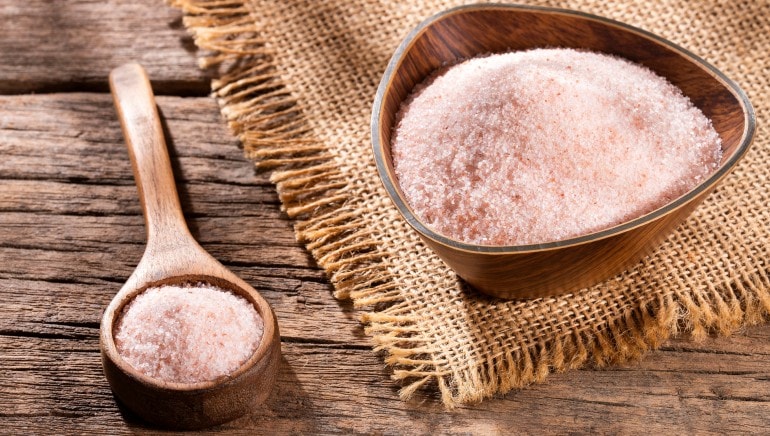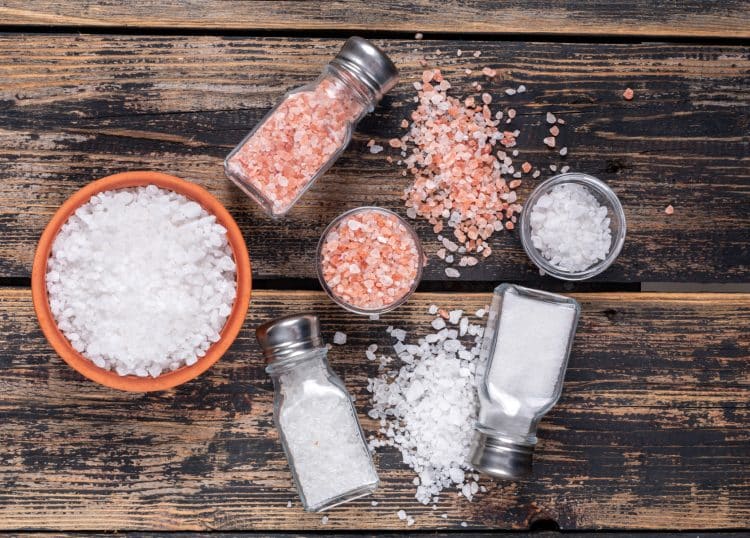Have you ever questioned whether salt could be an obstacle in your weight loss efforts? Many people assume that drastically cutting out salt from their diet is the ultimate solution to shedding unwanted pounds. But could this be a misconception? Is salt truly a barrier to weight loss, or has it been unfairly demonized? To help you navigate this debate, it’s essential to understand the intricate relationship between salt, sodium, and fluid retention, especially if you’re trying to lose weight in a natural and sustainable way.
In this article, we will dissect the complex role that sodium plays in your body, explain why salt is often considered a hindrance to weight loss, and offer practical tips to reduce your sodium intake without compromising flavor or overall health.

Why Is Salt Often Considered Bad for Weight Loss?
When it comes to weight loss, sodium – the essential mineral commonly associated with salt – is frequently misunderstood. Sodium plays a crucial role in maintaining fluid balance, ensuring proper nerve transmission, and supporting muscle function. However, when consumed in excess, it can trigger several physiological processes that impede weight loss. One of the most significant effects of high sodium intake is water retention, which can make you feel bloated and temporarily add weight without any actual fat accumulation.
To be clear, salt does not directly contribute to fat gain. Yet, the impact of water retention can cause fluctuations on the scale, leading to a temporary increase in body weight. For those focusing on immediate progress in their weight loss journey, seeing such shifts can be frustrating, even though it doesn’t reflect true fat accumulation.
How Salt Affects Your Body and Weight Loss
Now that we’ve established salt’s indirect influence on weight loss, let’s dive deeper into the various ways that sodium can impact both your body’s function and your weight loss progress.
1. Water Retention and Bloating
The primary mechanism through which salt affects weight loss is through water retention. When you consume too much salt, the sodium in your body binds with water, causing your body to hold onto excess fluid to maintain a proper sodium balance. This leads to bloating, puffiness, and an uncomfortable feeling of heaviness. While this may cause a temporary increase in body weight, it’s crucial to understand that this is not an indication of fat gain.
You might notice this effect after eating a particularly salty meal or consuming processed foods high in sodium. Although this temporary weight gain can be discouraging, it’s important to recognize that the weight fluctuation is not permanent, and once your sodium intake normalizes, the water weight will likely dissipate. Managing sodium intake can help reduce bloating and make it easier to track your true fat loss progress over time.
2. The Impact of Salt on Metabolism
Excess sodium intake doesn’t just affect fluid balance—it can also have a profound impact on your metabolism. One of the ways this happens is through an increase in blood pressure, which puts strain on your cardiovascular system. This additional strain can decrease overall energy levels, making it harder to stay active or engage in physical exercise. Regular physical activity is essential for sustainable weight loss, and anything that hampers your energy levels can slow down your progress.
Moreover, high sodium levels can hinder your body’s ability to burn fat efficiently. Studies have indicated that reducing sodium intake can lead to improved metabolic health, better fat oxidation, and a more efficient fat-burning process. This means that by moderating your sodium consumption, you can potentially boost your metabolism and enhance your ability to lose fat over time.
3. Salt and Cravings
Another way in which sodium can sabotage your weight loss goals is by influencing food cravings. It’s well-known that salty foods can trigger intense cravings for high-calorie, processed foods. This creates a vicious cycle of overeating unhealthy foods, making it much harder to stick to a clean, nutritious diet. A diet filled with whole foods, such as fresh fruits, vegetables, and lean proteins, is key to successful weight loss.
By cutting back on sodium, you may help curb these cravings, making it easier to make healthier choices and maintain a balanced diet. Interestingly, reducing your sodium intake could also help you enjoy the natural flavors of foods without feeling the need to add excess salt.
4. Salt and Insulin Resistance
Excessive salt consumption has also been linked to insulin resistance, a condition in which your body’s cells become less responsive to insulin. Insulin resistance is a key factor in the development of metabolic diseases like type 2 diabetes and obesity. When the body becomes insulin-resistant, it struggles to effectively use glucose (sugar) for energy, leading to increased fat storage rather than fat burning.
Reducing your sodium intake can help improve insulin sensitivity, allowing your body to more efficiently process glucose and burn fat. This is a crucial step for anyone trying to lose weight, as it supports your body’s natural ability to maintain healthy blood sugar levels and optimize fat metabolism.

How Much Salt Should You Consume for Weight Loss?
While it’s clear that too much salt can impede weight loss, the question remains: How much salt should you actually consume?
According to the Centers for Disease Control and Prevention (CDC), the recommended daily intake of sodium for adults is 2,300 mg or less. However, the average American consumes about 3,400 mg of sodium per day, which exceeds the recommended limit by a significant margin.
For those who are actively trying to lose weight or maintain a healthy lifestyle, it’s advisable to aim for lower sodium levels—around 1,500 mg per day. This lower level can help reduce water retention and bloating, leading to smoother and more noticeable weight loss progress. Paying attention to sodium intake is especially important if you notice any temporary weight fluctuations due to water retention after salty meals.
Tips for Reducing Salt Intake Without Sacrificing Flavor
Reducing your salt intake doesn’t mean sacrificing the flavor of your food. There are many ways to make meals taste delicious while cutting back on sodium.
1. Use Herbs and Spices
Instead of relying on salt for flavor, consider using fresh herbs like basil, cilantro, and rosemary, which can add a burst of flavor to your dishes. Spices like paprika, turmeric, garlic powder, and cumin can also provide a depth of flavor without the need for excess sodium.
2. Opt for Low-Sodium Alternatives
Many foods, such as canned vegetables, broths, and sauces, offer low-sodium versions. By selecting these alternatives, you can significantly reduce your overall sodium intake while still enjoying the foods you love.
3. Fresh and Whole Foods
Processed foods are often packed with hidden sodium, which makes it difficult to control your intake. Whole, fresh foods such as vegetables, fruits, lean proteins, and whole grains are naturally low in sodium and much better for overall health and weight loss. Focusing on these foods will help keep your sodium levels in check without sacrificing flavor.
4. Lemon and Vinegar
A simple squeeze of lemon or a splash of vinegar can add a tangy zest to your meals, making them flavorful without relying on salt.
5. Be Mindful of Restaurant and Fast Food
When dining out, always ask for your food to be prepared with less salt or request that the salt be served on the side. Restaurant dishes—especially fast food—are often overly salted, making it harder to control your sodium intake.
Frequently Asked Questions (FAQ)
1. Is salt bad for weight loss?
Excessive salt intake can hinder weight loss efforts by causing water retention and bloating. While salt doesn’t directly affect fat loss, it can create temporary fluctuations in body weight due to water weight, which can make tracking progress difficult.
2. Can I eat salt while trying to lose weight?
Yes, you can still consume salt, but moderation is key. The goal is to reduce excess sodium, particularly from processed foods, while ensuring you’re still getting enough for proper hydration and electrolyte balance.
3. Does salt cause belly fat?
Salt doesn’t directly cause belly fat, but excessive sodium can lead to bloating and water retention, making the stomach area appear puffier. Reducing salt can help minimize this effect.
4. How much salt should I consume for weight loss?
For optimal weight loss and health, aim to consume 1,500 mg of sodium per day or less. This will help prevent bloating, support metabolic function, and promote weight loss.
5. Can reducing salt help with belly bloating?
Yes, cutting back on salt can help reduce belly bloating caused by water retention. Lowering your sodium intake allows your body to release excess fluids, leading to a flatter stomach and improved digestion.
6. How can I reduce my salt intake?
Start by reducing processed foods, using fresh ingredients, and cooking with herbs and spices instead of salt. Choose low-sodium alternatives where possible, and be mindful of your salt consumption when dining out or purchasing packaged foods.
Salt and Weight Loss – A Cautionary Approach
Salt, while essential for maintaining proper body functions, can negatively impact your weight loss goals if consumed excessively. By reducing sodium intake, particularly from processed foods, you can prevent water retention and bloating, which will make it easier to track true weight loss progress.
Remember that balance is key. While sodium is important for various bodily functions, managing its consumption can make a significant difference in your weight loss journey. By making small, manageable changes—like using herbs and spices, opting for low-sodium alternatives, and focusing on whole, fresh foods—you can reduce your sodium intake without sacrificing flavor or health.
The road to successful weight loss is paved with consistent, sustainable habits. Cutting back on salt might seem like a small change, but it can have a profound impact on your overall progress and well-being.